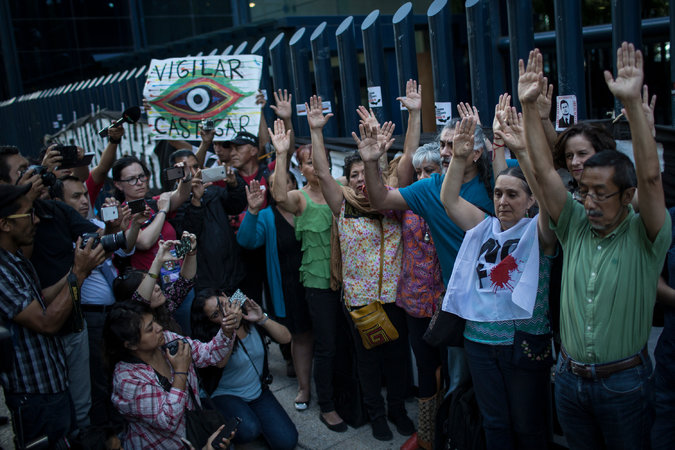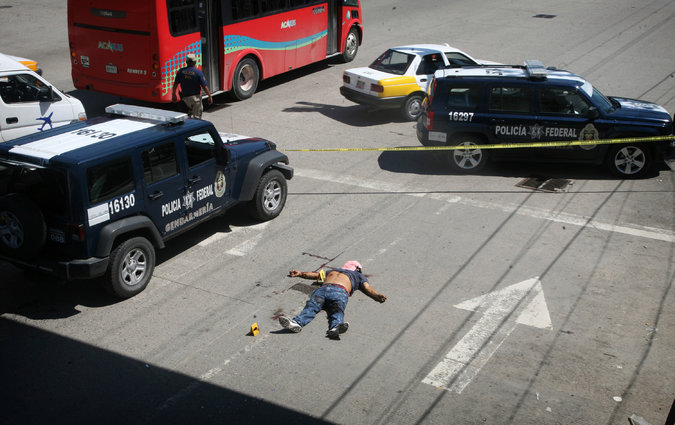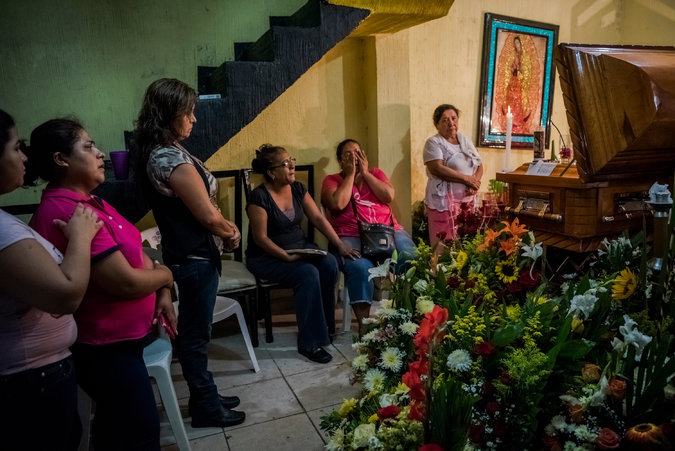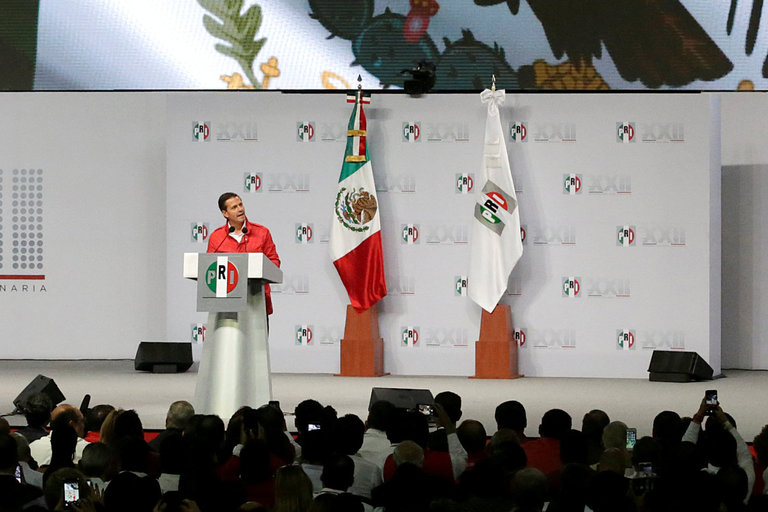This material belongs to: NY Times.
MEXICO CITY — President Enrique Peña Nieto sat before the nation’s titans of industry and allowed himself a smile.
Mexico’s business elite had invested record amounts of money in the country, giving life to the president’s promise of an economic renaissance and a welcome bright spot in an otherwise bleak landscape of scandals hovering over his administration.
But the president needed more from the nation’s top business leaders, perhaps his most important allies. He needed loyalty. According to five people who recounted the private gathering in May, the president turned to Claudio X. González Laporte, a corporate chairman revered in Mexico.
Your son, the president told him, needs to stop being so critical of the government.
The room fell quiet. Mr. González’s son had spent nearly two decades fighting the twin plagues of corruption and impunity blighting Mexico. But his latest endeavor, an investigative news group that has exposed contract rigging by Mr. Peña Nieto’s allies, was making too much noise for the president’s liking.
“Civil society should not spend so much time talking about corruption,” the president scolded Mr. González. The powerful crowd sat stunned at the attack on one of their own, until Mr. González broke the silence.
“I’m proud of my son and the work he is doing,” he responded.
Even in Mexico, where state pressure is often delivered with a heavy hand, a president openly attempting to silence a member of one of his most trusted constituencies was seen as exceptional, according to the people who recounted the exchange. The president’s office denied the rebuke, saying Mr. Peña Nieto had offered a more general message to the crowd, encouraging it to focus as much on Mexico’s achievements as on the government’s shortcomings.
But the episode was only the latest in a string of attempts to silence Mr. González’s son and his work.
Those attempts include exhaustive government audits and the targeting of Mr. González’s son with advanced spying technology purchased by the Mexican government for the sole purpose of investigating terrorists and organized crime.
On two occasions in 2016, Mr. González’s son received messages on his cellphone intended to deploy the spyware, hacking attempts that came shortly after damning reports published by his group, according to an independent forensic analysis.
“We are under siege,” the son, Claudio González Jr., said in a statement to The New York Times, declining to be interviewed. “But we will continue to denounce corruption and impunity whenever we find it, be it public or private.”

“Mexico is not condemned to be corrupt,” he added.
The spying scandal has rocked Mexico. Nearly two-dozen people, including some of the country’s most prominent journalists, academics and human rights lawyers, as well as international officials investigating crime in Mexico, have been targeted with sophisticated cybertechnology, known as Pegasus, that was bought by the government for tens of millions of dollars.
The government has denied knowledge or responsibility in all of the cases, and has begun its own inquiry to determine who authorized and ran the spying campaign.
But Mr. González Jr. is perhaps the clearest instance in which the president has been described as openly criticizing and trying to silence a target of the spying, potentially bringing Mr. Peña Nieto closer to the hacking scandal than in any other case.
And that is not the only punitive action the government has taken against the family.
In a single day this year, the authorities initiated nine separate audits of organizations that Mr. González Jr. has been deeply involved with, and the government has signaled that it may revoke some of their nonprofit statuses, according to representatives of the organizations and others with firsthand knowledge of the audits. Some donors are already considering halting contributions, fearful of being seen as taking sides against the government.
“If you combat corruption, corruption will combat you,” added Mr. González Jr., who received a personal audit from the government on the same day that his organizations did. “Change comes at a price.”
The president’s office rejected assertions that it had tried to intimidate the González family, or any critics in Mexico, “in any way.” It denied singling out Mr. González and his son at the business meeting, saying the president had simply told the crowd that highlighting the nation’s advances “are as necessary” as pointing out “the deficiencies of the government’s actions.”
“It is absolutely false that the government is trying to coerce, in any way, the work of any civil society organization, whose works are disseminated and debated freely,” the president’s office said.
Mr. Peña Nieto came to office five years ago promising to fix Mexico — to modernize its economy, mend its reputation for violence and repair its broken rule of law. Transparency would shine a light on the corruption that stunted the nation, he pledged. His party, synonymous with autocratic rule during the seven decades it was previously in power, would become the change agent the country needed so desperately.
But violence has soared and freedom of speech has been stifled by murder and money. Mexico is one of the deadliest countries in the world for journalists, and nearly all of those homicides remain unsolved. Across the country, drug-war violence has reached a 20-year-high, puncturing the image of a new Mexico that the president has tried so hard to promote.
Now, the efforts against Mr. González Jr. and his group, Mexicans Against Corruption and Impunity, offer a new window into how criticism is handled in Mexico, even within the most elite circles of society.

Mr. González Sr., 83, is one of Mexico’s most venerated — and wealthiest — figures in the business world, the chairman of Kimberly-Clark de Mexico for decades. And his son, 54, is a rarity in such elite circles, considering the family fortune. Mexico’s rich are often criticized for their indifference to social causes and their tendency to bend to the will of the government.
But Mr. González Jr. has leveraged his privilege, pressuring his peers to take on social issues. He started a nonprofit, Mexicans First, to promote public education in Mexico, which is among the worst of all members of the Organization for Economic Cooperation and Development, the research and policy organization of the world’s richest countries.
Nearly two years ago, he co-founded the anticorruption group, focusing on investigative journalism, research and legal action. The group hired some of Mexico’s most prominent journalists, giving them license to pursue whatever targets they saw fit, an unusual freedom in a media landscape dependent on hundreds of millions of dollars in government advertising.
Their stories include an investigation into land grabs by a state governor in beach towns like Tulum, the revelation that government-favored companies were leaked information to help them bid on public contracts, and an investigation detailing how a friend of the president’s had collected more than $650 million from the government by gaming public contracts to provide electricity meters for the country.
Mr. González Jr. has been unsparingly vocal himself. At a conference at Ibero-American University in Mexico City on Feb. 1, he criticized the president personally, telling a panel, “If there were such a thing as a hall of infamy, Peña Nieto would be in the top 10.”
A few weeks later, on Feb. 27, the tax authorities announced nine audits related to five organizations that were either founded or run by Mr. González Jr. in the last 20 years. Mexicans Against Corruption and Impunity was not among them. Its audit came later.
People close to Mr. González Jr. say that he was aghast and asked an economist to calculate the odds of even five audits randomly occurring on the same day against firms he was affiliated with. The answer he got back: 1 in 200 quadrillions, or a 0.0000000000000000000000000204 percent chance.
The government says it is prohibited from discussing individual cases, but it noted that the tax authorities had started a series of audits of nonprofits — to prevent money laundering through donations. The initiative was announced less than two weeks after Mr. González Jr. and his organizations received their audits.
To those involved in the groups, the audits were an obvious scare tactic, an overt way to threaten their activities. But even before that, in the summer of 2016, someone using government software had secretly tried to hack into and take over Mr. González Jr.’s cellphone.
In July 2016 and again that August, his phone was targeted by Pegasus, a software sold to the Mexican government by NSO Group, an Israeli cyberarms manufacturer, on the condition that it be used only to monitor criminals or terrorists.

When the target clicks a link in a text message, the software infects the user’s phone, tracking every detail of the person’s digital life, including encrypted messages. It can even use the camera and microphone to spy on the person.
The hacking attempts came weeks after reports from Mr. González Jr.’s anticorruption group and another organization that struck at the president’s allies, including the governor of Veracruz at the time, Javier Duarte, who is now under arrest and charged with overseeing a vast empire of corruption.
Two reporters working for his nonprofit were also targeted with the spyware, according to an analysis by researchers at R3D, a digital rights group in Mexico, and Citizen Lab at the Munk School at the University of Toronto.
In recent months, forensic evidence of a broad hacking campaign against government critics has emerged. The targets have included lawyers investigating the case of 43 students who disappeared en masse after clashing with the police, a journalist who revealed a questionable real estate deal by the president’s wife, academics fighting corruption and the family members of critics, including a teenage son living in the United States.
The government has begun its own investigation, but its approach has sent a chill through the hacking victims. Rather than simply demanding that the government agencies with the software release their target lists and the information obtained, prosecutors are demanding the phones of everyone who claimed to have been targeted.
The hacking victims have balked, worried that the request is meant to further intimidate them or provide the government with all the information that the hackers were trying to steal in the first place.
The Mexican government, by contrast, says it needs the phones to verify the presence of the spyware on them, calling that an “indispensable” part of establishing whether a crime has been committed.
But there is strong evidence to suggest that such a request is unnecessary. A similar investigation conducted in Panama, where the former president has been charged with using Pegasus against more than 150 of his adversaries, never required the victims to turn over their phones, according to court documents and interviews with several of the targets there.
“It is absurd that the authorities in Mexico would ask the targets to hand in their phones,” said Balbina Herrera, a target of espionage and a presidential candidate who ran against Ricardo Martinelli, the former Panamanian president accused of the spying. “They are simply re-victimizing them.”
Forensic experts also say the Mexican government does not need the victims’ phones to conduct a thorough investigation.
“Phones aren’t needed to prove illegal targeting with NSO spyware,” said John Scott-Railton, a senior investigator at Citizen Lab, who confirmed the use of Pegasus against Mr. González Jr. “In the Panama investigation, victims were shown what the government had taken, and asked to confirm it was their information.”
But, he added, “in the Mexican investigation, the first thing the prosecutor asks for is the phones the government is accused of trying to snoop on.”


